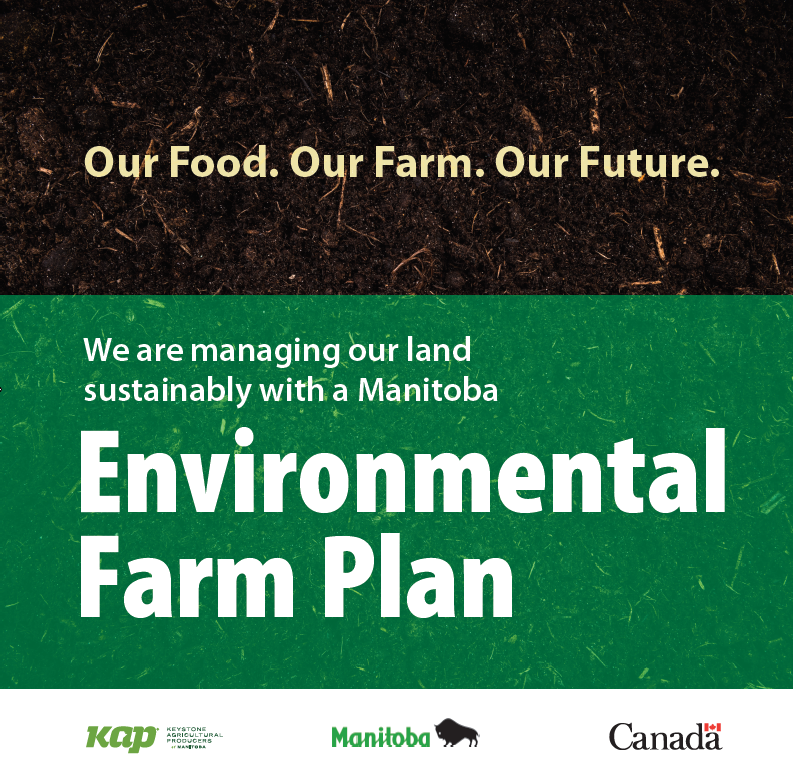Environmental Farm Plan
Our Food. Our Farm. Our Future.
DISCLAIMER: Once you click the link, you will be leaving the Government of Manitoba website and entering a third-party, secure webpage administered by Keystone Agricultural Producers (KAP). Your personal information will not be stored on the government’s server and will be kept in the care of KAP.
If you do not have access to stable Internet or require assistance call 1-844-769-6224 (toll free).
“The new online process to complete the Environmental Farm Plans went smoothly for all Association of Manitoba Community Pasture Managers. The site, and the information on it, is really well organized and makes it easy and efficient to have EFPs in place. "
- Rachel Whidden, Project Coordinator, AMCP
How does the online EFP work? SNEAK PEEK
IMPORTANT: Properly Rinse your Pesticide Containers!
It is essential that immediately after pesticide is used, pesticide containers are properly rinsed and prepared for disposal. Proper rinsing will help you to meet provincial pesticide control requirements and ensure no product is wasted. Pesticide containers that are not rinsed can end up contaminating soil, surface water and groundwater, affecting plants, animals and potable water supplies. Proper rinsing also enables these containers to be recycled.
- Rinse: Use a chemical handler, pressure washer or manually triple rinse containers according to the directions here. Don’t forget to rinse the cap.
- Remove/Bag: Remove paper booklets and cap and dispose of in your regular trash (neither of these is to be recycled). Bag similar sized properly rinsed empty jugs in Cleanfarms bag (free bags may be obtained from your local ag retailer or municipality). Ensure seed treatment containers are bagged separately.
- Return: Return to your municipal collection site or to your participating retailer or seed dealer. First check with your municipal site to ensure they are still collecting these containers (see below). You can check the transition schedule for your area by going to this site.
NEW: Transitioning Small Container Collection from Municipal to Retail Sites
In Manitoba, municipalities have traditionally been the collection agent of pesticide containers 23L and smaller. Gradually, this is changing to ag retailers being the only collectors of pesticide containers. See more information on the transition plan here.
Large acreage farms in the prairies may be eligible for free on-farm pickup of large numbers of containers 23 L and smaller, seed/pesticide & innoculant bags, drums and totes. For more information, call Cleanfarms at 1-877-622-4460.
Reminder: Store unwanted pesticides and old livestock/equine health medications safely until the next designated collection event.
Manitoba's EFP
Environmental farm planning enables Manitoba to be a producer of safe, high quality food in a sustainable manner. Since 2004, Manitoba has offered the Environmental Farm Plan (EFP) as a voluntary assessment tool for producers. Keystone Agricultural Producers (KAP) assist with EFP delivery to maintain producers' confidentiality. Environmental farm planning helps farm managers identify agri-environmental assets and risks, develop an action plan to help mitigate risks, meet sustainable marketing requirements and access agri-environmental cost-share programming. Environmental Farm Planning also provides an element of public trust both provincially and federally and is currently supported through the Sustainable Canadian Agricultural Partnership.
 By implementing an EFP, producers are able to improve air, water and soil quality while conserving biopersity on Manitoba farmland. Environmental farm planning contributes to environmental protection and conservation, and makes our province's agricultural products commodities more marketable to environmentally conscious consumer.
By implementing an EFP, producers are able to improve air, water and soil quality while conserving biopersity on Manitoba farmland. Environmental farm planning contributes to environmental protection and conservation, and makes our province's agricultural products commodities more marketable to environmentally conscious consumer.
Beneficial Management Practices
Under the Sustainable Canadian Agriculture Partnership (Sustainable CAP), there are a number of cost-shared agri-environmental incentives associated with the EFP.
Sustainable Agriculture Manitoba (SAM)
Resilient Agricultural Landscapes Program (RALP)
EFP Farm Gate Signs

EFP Farm Gate Signs are available to producers who have completed the Environmental Farm Planning Process. The sign acknowledges your efforts and encourages others to follow your example of using environmentally responsible and sustainable practices on your farm. A copy of your Statement of Completion is required to obtain a sign. If you are interested in receiving a sign, please email ManitobaEFP@gov.mb.ca with FARM SIGN in the subject line and further arrangements will be made.
For more information, contact your local Manitoba Agriculture Office.

